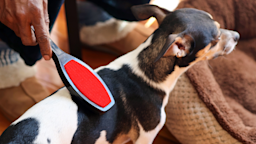Key takeaways:
Jennifer Edwards’ dog Sunday got sick and needed treatment. Jennifer suspected it was because he had eaten something poisonous.
The vet couldn’t tell whether Sunday was sick because he ate something bad or had a bad case of fleas. Sunday needed IV fluids, medication, and observation.
Jennifer learned that it can be hard to tell why your pet is throwing up. You may need to take them to see a vet.
Our Lab mix Sunday was 6 weeks old and the seventh of seven puppies when he came to live with us 8 years ago. He left behind brothers and sisters named Monday, Tuesday, Wednesday, Thursday, Friday, and Saturday.
But the minute his foster mom set him down, he bounded onto the couch and settled between my two young daughters. It was as if he’d always been with us.
Sunday licked their fingers as they petted the white streak blazing from his neck to his belly. We soon learned that this furry comet trail is an invitation for belly rubs. It’s also a not-so-subtle suggestion to fill his belly with treats.
Search and compare options
Our dog snuck food right out of the trashcan
We knew we should be careful about what we fed Sunday and avoid giving him people foods that are poisonous for dogs.


Because he loves to sneak food, we began being careful to throw away leftovers right after dinner. Otherwise, our pizza crusts and chicken scraps disappeared off plates waiting for the dishwasher. I swapped an open-top trashcan for a covered trashcan in the pantry. After finding savaged bags on the kitchen floor in the mornings, I also began taking out the trash every night.
Sunday never grew out of his opportunistic habits. We replaced the pantry door because the old one was too easy to get into.
We wondered if he ate something poisonous
These precautions seemed to work for years. And then, one summer afternoon, he started throwing up. At first, his vomit was thin and green, like bile. We gave him plenty of water, and he didn’t throw up again that day. He ate his usual dry food. But he seemed to be scratching more than usual. We decided we’d keep an eye on him.
The next day, Sunday didn’t eat much and seemed sluggish. But then he ate his food again, drank water, and seemed to perk up. He watched jealously as I searched his crate, combing through the blankets. I found an empty plastic water bottle chewed flat and pocked with teeth marks but still intact. There was nothing that pointed to an illicit meal.
Our kids’ gaming controller batteries were missing


Sunday seemed fine until he threw up again the next morning — the remains of his dry dog food. His hair seemed a little thinner on his back. Was that new? I wasn’t sure.
Read more like this
Explore these related articles, suggested for readers like you.
One of the girls mentioned that she couldn’t find the AA batteries from their Xbox controller. She thought she may have seen Sunday with one. We couldn’t find the batteries anywhere. We also couldn’t find any metal scraps or anything in the yard showing they’d passed through his system. Now I was very worried.
I took him to our vet for an emergency appointment.
Something poisonous, or something else? The vet’s take


Sunday’s doctor is a hometown vet with colorful turns of phrase. The vet gave him a full physical exam that day to learn why he was throwing up. The vet and a staff member checked his weight — 67 lbs. They felt his stomach and looked into his floppy ears. They checked his shot and medication records and watched him interact with us. They noticed his tired eyes.
They took his temperature and pulse. The vet listened to Sunday’s lungs and checked his lymph nodes. Had the nodes been larger than usual, that might have indicated that Sunday had an infection or serious illness. But everything was normal.
The vet noticed that Sunday had a lot of fleas. He said that wasn’t unusual for summertime in Florida, even though Sunday stayed indoors most of the time. The vet said having too many fleas could have caused or worsened Sunday’s nausea. The thinning hair on his back was in a pattern called “racing stripes.” We learned that’s a symptom of a flea infestation.
Could it be an allergic reaction to fleas?
The vet couldn’t say whether Sunday had eaten something poisonous or was reacting badly to fleas. He thought it was the latter. He called it flea-allergic dermatitis.
But our pup was dehydrated and needed subcutaneous fluids — fluids injected into the tissue under the layer of fat just beneath the skin. To my young daughters’ delight, Sunday looked like a tail-wagging black camel when we brought him home. It took his tissues a few hours to absorb the fluids from the site on his shoulders. The vet also gave Sunday a shot of anti-nausea medicine called Cerenia.
The vet suggested a cortisone cream for Sunday’s itchy skin, as well as the anti-flea medication Bravecto. Because Sunday had to take his Bravecto as a pill, we waited for his stomach to settle before we gave it to him. It was very effective, and we’ve used it ever since.
The vet said that if Sunday didn’t improve, he would need X-rays, bloodwork, or a fungal culture. But Sunday made a full recovery in a day or two. Our vet bill was $212 with the medications, although it would have been a lot more costly if he had needed more testing.
When your pet gets sick, you may never have all the answers
We never found out for sure whether Sunday’s sickness was from eating stolen batteries or having a bad case of fleas.
But we did learn an important lesson: You can take every precaution, but your pets may still find and eat something that can make them sick. But then again, the cause could be something else. You may need a vet to help you find and treat the underlying cause.

Why trust our experts?





















